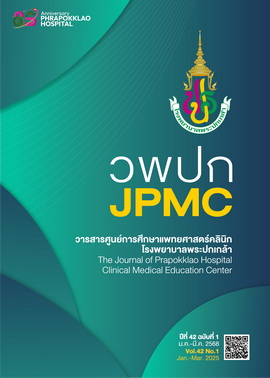ความเครียด ภาวะซึมเศร้า และกลยุทธ์การรับมือของบุคลากรทางการแพทย์เขตสุขภาพที่ 10 ที่ปฏิบัติงานเกี่ยวกับการระบาดของไวรัสโคโรนา 2019
Main Article Content
บทคัดย่อ
ที่มาของปัญหา: การระบาดของโรคโควิด-19 ทำให้บุคลากรทางการแพทย์ต้องทำงานหนักขึ้นและเสี่ยงต่อการติดเชื้อ อาจนำไปสู่ภาวะเครียดและซึมเศร้า การศึกษานี้จึงมุ่งสำรวจปัจจัยบรรเทาความเครียดและกลยุทธ์ในการรับมือเพื่อพัฒนามาตรการดูแลสุขภาพจิต
วัตถุประสงค์: เพื่อศึกษาความเครียด ภาวะซึมเศร้า ปัจจัยบรรเทาความเครียดและกลยุทธ์รับมือของบุคลากรทางการแพทย์เขตสุขภาพที่ 10 ในช่วงการระบาดของโรคโควิด-19
วิธีการศึกษา: การศึกษาเชิงวิเคราะห์ภาคตัดขวางในบุคลากรทางการแพทย์เขตสุขภาพที่ 10 ที่ดูแลผู้ป่วยโควิด-19 จำนวน 434 คน เก็บข้อมูลผ่านแบบสอบถามชนิดออนไลน์ระหว่างมกราคม ถึงมีนาคม พ.ศ. 2565 ประกอบด้วยข้อมูลส่วนบุคคล การประเมินความเครียดและภาวะซึมเศร้า ปัจจัยบรรเทาความเครียดและกลยุทธ์การรับมือ วิเคราะห์ข้อมูลด้วยสถิติเชิงพรรณนาและวิเคราะห์ความสัมพันธ์ด้วย Chi-square, Fisher's exact test, t-test และ Spearman's correlation coefficient ที่ระดับนัยสำคัญทางสถิติ 0.05
ผลการศึกษา: กลุ่มตัวอย่าง เป็นเพศหญิงร้อยละ 88 ส่วนใหญ่เป็นพยาบาลร้อยละ 61.5 มีความเครียดระดับปานกลางร้อยละ 73.0 และมีภาวะซึมเศร้าร้อยละ 18.4 วิชาชีพพยาบาลมีระดับความเครียดสูงมากที่สุดร้อยละ 12.4 พบว่า เพศและอายุในกลุ่มที่มีภาวะซึมเศร้าแตกต่างจากกลุ่มที่ไม่มีภาวะซึมเศร้าอย่างมีนัยสำคัญทางสถิติ (p=0.04) ปัจจัยที่ช่วยลดภาวะซึมเศร้า ได้แก่ การได้รับทัศนคติเชิงบวกจากเพื่อนร่วมงาน ผู้ป่วยที่ติดเชื้ออาการดีขึ้น ครอบครัวปลอดภัย มีอุปกรณ์และมาตรการป้องกันที่มีประสิทธิภาพ การได้รับคำแนะนำการป้องกันการติดเชื้อที่ถูกต้อง การทำงานเป็นทีม การมีความเชื่อมั่นในศักยภาพโรงพยาบาล และการมีวัคซีนที่เพียงพอ ส่วนกลยุทธ์ที่ช่วยลดภาวะซึมเศร้า ได้แก่ ปฏิบัติตามมาตรการป้องกัน ระมัดระวังผู้ป่วยที่มีไข้แม้ผลตรวจเป็นลบ เรียนรู้เกี่ยวกับโรค เดินทางแบบส่วนตัว ทำกิจกรรมผ่อนคลาย พูดคุยกับครอบครัวและเพื่อน มองโลกในแง่บวก จำกัดการรับข่าวสารด้านลบ ระบายอารมณ์ที่เหมาะสม และออกกำลังกายหรือเล่นกีฬา
สรุป: บุคลากรทางการแพทย์มีปัญหาสุขภาพจิตเพิ่มขึ้นในช่วงการระบาด ปัจจัยบรรเทาความเครียดและกลยุทธ์รับมือที่เหมาะสมสามารถลดภาวะซึมเศร้าได้ จึงควรส่งเสริมการใช้ปัจจัยเหล่านี้และพัฒนาระบบดูแลสุขภาพจิตเพื่อป้องกันและดูแลสุขภาพจิตของบุคลากรทั้งในช่วงการระบาดและวิกฤตในอนาคต
Thaiclinicaltrials.org number, TCTR20250118004
Article Details

อนุญาตภายใต้เงื่อนไข Creative Commons Attribution-NonCommercial-NoDerivatives 4.0 International License.
เอกสารอ้างอิง
World Health Organization. Coronavirus disease (COVID-19) pandemic [Internet]. 2024 [cited 2024 Sep 9]. Available from: https://www.who.int/emergencies/diseases/novel-coronavirus-2019
Lai J, Ma S, Wang Y, Cai Z, Hu J, Wei N, et al. Factors associated with mental health outcomes among health care workers exposed to coronavirus disease 2019. JAMA Netw Open 2020 [cited 2024 Oct 1];3(3):e203976. Available from: https://jamanetwork.com/journals/jamanetworkopen/fullarticle/2763229
Pappa S, Ntella V, Giannakas T, Giannakoulis VG, Papoutsi E, Katsaounou P. Prevalence of depression, anxiety, and insomnia among healthcare workers during the COVID-19 pandemic: a systematic review and meta-analysis. Brain Behav Immun 2020;88:901-7.
Nguyen LH, Drew DA, Graham MS, Joshi AD, Guo CG, Ma W, et al. Risk of COVID-19 among front-line health-care workers and the general community: a prospective cohort study. Lancet Public Health [Internet]. 2020 [cited 2024 Oct 1];5(9):e475-83. Available from: https://pmc.ncbi.nlm.nih.gov/articles/PMC7491202/pdf/main.pdf
Muller AE, Hafstad EV, Himmels JPW, Smedslund G, Flottorp S, Stensland SØ, et al. The mental health impact of the covid-19 pandemic on healthcare workers, and interventions to help them: a rapid systematic review. Psychiatry Res [Internet]. 2020 [cited 2024 Oct 1];293:113441. Available from: https://pmc.ncbi.nlm.nih.gov/articles/PMC7462563/pdf/main.pdf
Spoorthy MS, Pratapa SK, Mahant S. Mental health problems faced by healthcare workers due to the COVID-19 pandemic-a review. Asian J Psychiatr [Internet]. 2020 [cited 2024 Oct 1];51:102119. Available from: https://pmc.ncbi.nlm.nih.gov/articles/PMC7175897/pdf/main.pdf
Sangsirilak A, Sangsirilak S. Stress and depressed mood in healthcare workers during COVID-19 outbreak. J Psychiatr Assoc Thailand 2020;65:401-8.
Netirojjanakul W. Prevalence and associated factors of mental health problems on healthcare workers at Nakhonpathom hospital in Corona virus disease 2019 (COVID-19) epidemic era. Region 4-5 Medical Journal 2020;39:616-27.
Komwong D, Prasanthanakul J, Phanasathit M, Wongwan T. Work-related factors and mental health outcomes among healthcare workers during COVID-19 pandemic. Journal of Health Systems Research 2022;16:54-68.
Sittironnarit G, Raksintham N, Wannasewok K, Phatthayuttawat S. Job stress, coping strategies and quality of working life of personnel in a general hospital. J Prapokklao Hosp Clin Med Educat Center 2018;35(2):163-76.
Cai H, Tu B, Ma J, Chen L, Fu L, Jiang Y, et al. psychological impact and coping strategies of frontline medical staff in Hunan between January and March 2020 during the outbreak of coronavirus disease 2019 (COVID‑19) in Hubei, China. Med Sci Monit [Internet]. 2020 [cited 2024 Oct 1];26:e924171. Available from: https://pmc.ncbi.nlm.nih.gov/articles/PMC7177038/pdf/medscimonit-26-e924171.pdf
Kriangburapa W, Yampratoom R, Pattrakornkul N. Psychological status, coping strategies and knowledge of medical personnel toward children with an acute respiratory tract infection during a COVID-19 outbreak. Burapha Journal of Medicine 2021;8(1):56-67.
Wongpakaran N, Wongpakaran T. The Thai version of the PSS-10: an investigation of its psychometric properties. BioPsychoSocial Medicine [Internet]. 2010 [cited 2024 Oct 1];4:6. Available from: https://bpsmedicine.biomedcentral.com/counter/pdf/10.1186/1751-0759-4-6.pdf
Lotrakul M, Sumrithe S, Saipanish R. Reliability and validity of the Thai version of the PHQ-9. BMC Psychiatry [Internet]. 2008 [cited 2024 Oct 1];8:46. Available from: https://pmc.ncbi.nlm.nih.gov/articles/PMC2443128/pdf/1471-244X-8-46.pdf
Khalid I, Khalid TJ, Qabajah MR, Barnard AG, Qushmaq IA. Healthcare workers emotions, perceived stressors and coping strategies during a MERS-CoV outbreak. Clin Med Res 2016;14:7-14.
Lee SH, Juang YY, Su YJ, Lee HL, Lin YH, Chao CC. Facing SARS: psychological impacts on SARS team nurses and psychiatric services in a Taiwan general hospital. Gen Hosp Psychiatry 2005;27:352-8.
da Silva Neto RM, Benjamim CJR, de Medeiros Carvalho PM, Neto MLR. Psychological effects caused by the COVID-19 pandemic in health professionals: a systematic review with meta-analysis. Prog Neuropsychopharmacol Biol Psychiatry [Internet]. 2021 [cited 2024 Oct 1];104:110062. Available from: https://pmc.ncbi.nlm.nih.gov/articles/PMC7409979/pdf/main.pdf
Inpa C, Sriprasert P. Prevalence and factors related to stress and depression of healthcare workers at Somdejphrajaotaksinmaharaj hospital in COVID-19 pandemic. Chiangrai Medical Journal 2021;13(2):153-65.

